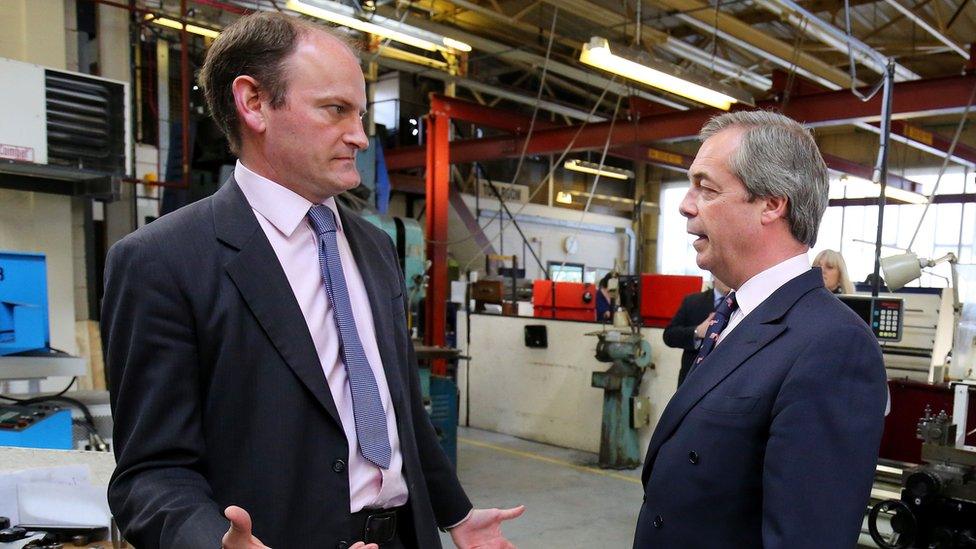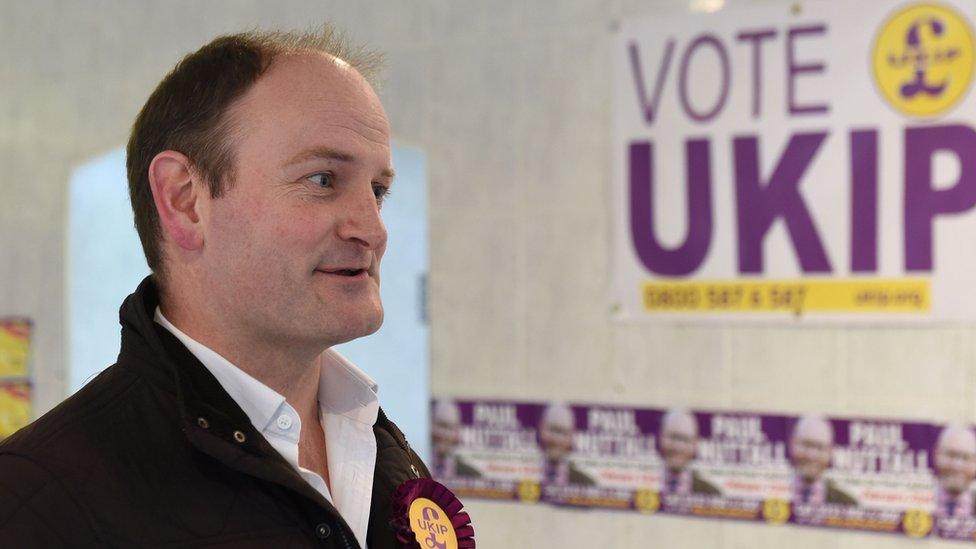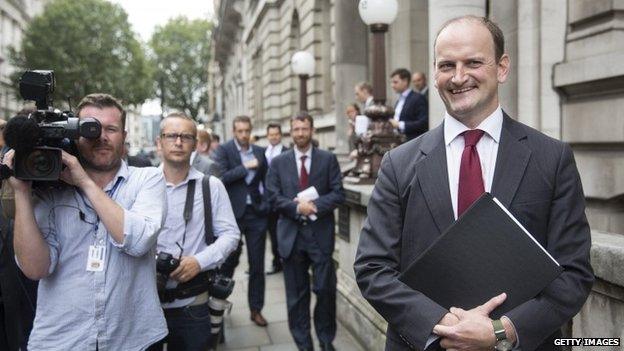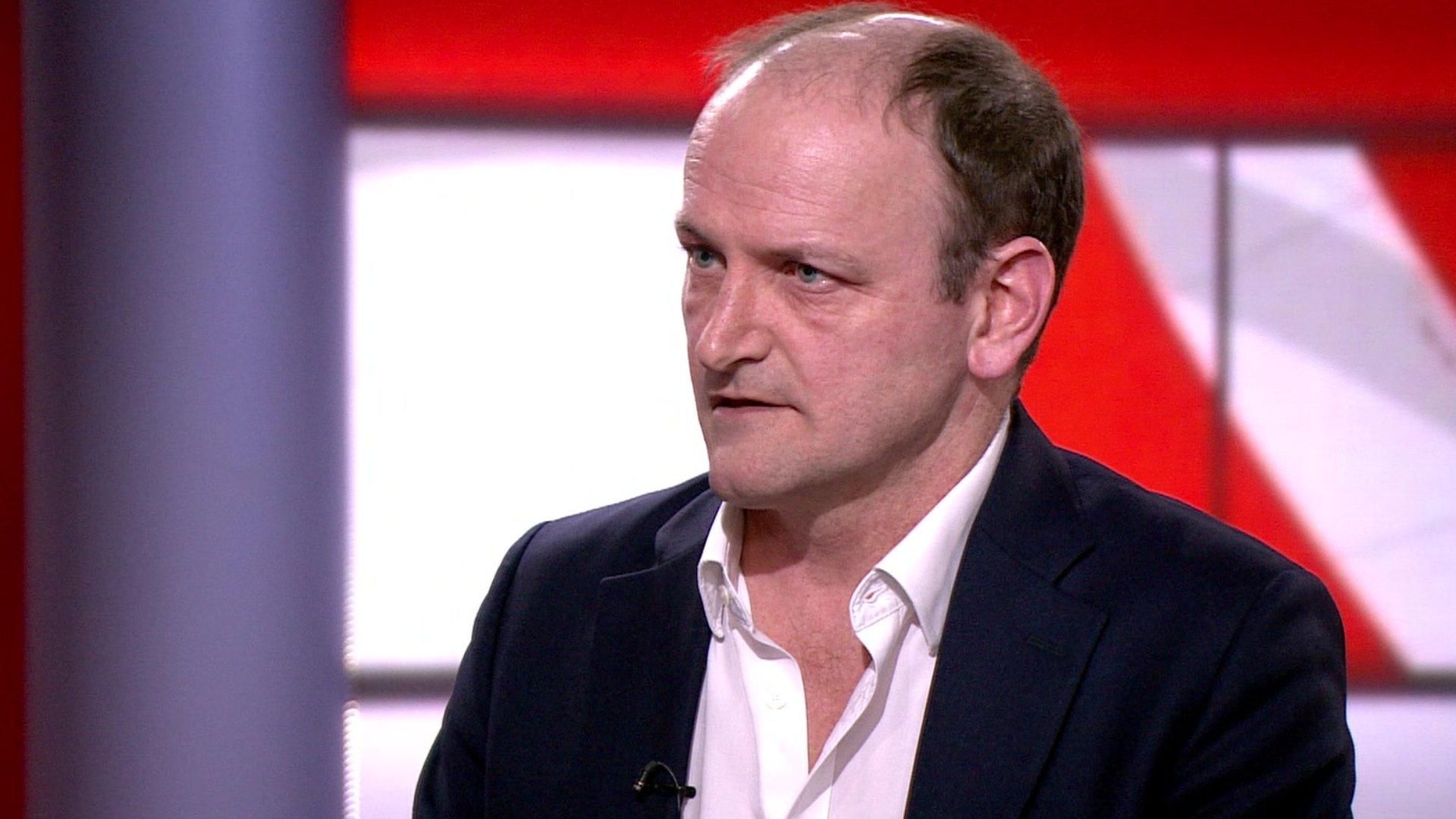Douglas Carswell: The political maverick
- Published

Douglas Carswell and former UKIP leader Nigel Farage were never soul mates
The news that Douglas Carswell has left UKIP will surprise few at Westminster.
He remains the only MP ever to be elected on a UKIP ticket, but he was never a soulmate of former party leader Nigel Farage.
The two had an increasingly bitter relationship, with some going as far as to suggest Mr Carswell was a "fifth columnist" who joined the party to try and undermine it.
Mr Farage told the BBC recently Mr Carswell "has tried to undermine everything we've stood for for a very long time".
There may be many reasons for their differences, but at heart they had different approaches to the EU referendum and whether or not immigration should be the key campaign issue.
Party donor Arron Banks and Mr Carswell have also publicly rowed.
Mr Banks has previously suggested he could stand against Mr Carswell at the next election, and responded with a smiley face emoji and a green tick to the news he was leaving UKIP.
In a statement on his website, external, Mr Carswell insisted he was leaving the party "amicably" and would be an independent MP.
He said his decision to leave followed UKIP achieving "what we were established to do" following the UK's vote to leave the EU in June.
'Fundamental change'
In 2014 Mr Carswell defected as an MP from the Conservatives to UKIP, saying he wanted to see "fundamental change in British politics".
He then made history when he became UKIP's first elected MP, after winning the Clacton by-election he triggered by his defection.
He was one of two MPs to defect from the Conservatives, but became the party's only MP after he retained his seat on a reduced majority and Mark Reckless lost his in Rochester and Strood.
Douglas Carswell: "Only UKIP can shake up that cosy little clique called Westminster"
Mr Farage praised Mr Carswell's decision to join UKIP as "brave" and "honourable", but the pair's rivalry would prove to be an ongoing theme during his time in the party.
The politicians both backed rival Leave groups during the EU referendum and when Mr Farage resigned as leader in July Mr Carswell responded by tweeting a smiley face.
But Mr Carswell chose not to stand as leader himself, a position that went to Paul Nuttall.
Last month it was claimed that Mr Carswell had resisted attempts by senior UKIP figures to secure a knighthood for Mr Farage.
This prompted Mr Nuttall to ask party chairman Paul Oakden to meet Mr Carswell last month to "discuss the situation" amid growing questions about the MP's future in the party.
In a statement on his website, external, Mr Carswell said the party had not managed to win many seats in Parliament "but in a way we are the most successful political party in Britain ever".
EU relationship
Both before and during his time with UKIP, Mr Carswell has had a reputation for being a free thinker.
He has never hidden his disdain for the "job for life" culture among some MPs in safe seats and the "cosy cliques" that dominate decision-making in government.
Most newly-elected MPs put their head down and get on with the job of climbing the Westminster career ladder.
But Mr Carswell, who entered the Commons in 2005, refused to play the game from the start, speaking openly of his "revulsion" at the system and how, frankly, he was embarrassed to be an MP.
In his book, The Plan, co-authored with Tory MEP Daniel Hannan, he set out 28 steps to "renew our broken democracy" and "get our supine, spineless Parliament off its knees".
He had high hopes that David Cameron, whom he backed in the 2005 Tory leadership contest, would push through some of their proposed reforms - such as open primaries, where all voters in a constituency get to choose party candidates, and giving voters the power to recall their MP if they are doing a bad job.
But in February 2014, along with other maverick backbench Tories, he was bitterly disappointed to see plans for recall powers dropped by the coalition.
This - together with his belief that the Conservatives were not truly committed to changing Britain's relationship with the EU - undoubtedly fed into his decision to jump ship to UKIP.

Mr Carswell had long agitated for a referendum on whether Britain should remain in the EU - an institution he views as being profoundly undemocratic and lacking in accountability.
'Undermining democracy'
Born in 1971, Mr Carswell spent his early years living in Uganda, where his parents worked as doctors in a local hospital.
He was educated at the University of East Anglia and King's College, London, and worked in digital television, investment management and the Conservative Party policy unit - run by David Cameron - before becoming an MP.
He is married to Clementine and has a daughter. In his spare time, he has said he enjoys swimming, running and gardening as well as making quince jelly.
Mr Carswell's father was the inspiration for James McAvoy's character in the Last King Of Scotland, the British doctor who went to work in Uganda and found himself working for Idi Amin.
Mr Carswell first stood for Parliament in 2001, taking on Tony Blair as the Tory candidate for Sedgefield.
Despite apologising for coming second, he still managed to cut Mr Blair's majority by more than 7,500 votes.
In 2005 he was elected as MP for Harwich, defeating Labour's candidate by just 920 votes. By 2010 he defeated the same opponent by 12,000 votes - although boundary changes had seen the seat renamed Clacton.
During that contest UKIP did not field a candidate, supporting what they saw as the re-election of a kindred spirit.

Mr Carswell went on to gain a reputation as an outspoken Tory moderniser, influencing initiatives such as David Cameron's Big Society and campaigning for the reform of parliamentary expenses following the 2009 scandal.
He once told the BBC he was attracted to politics because "our democracy is being undermined, with remote and unaccountable elites making the key decisions that affect our lives".
Less than three years ago Mr Carswell said only UKIP could provide "fundamental change in British politics".
Now the result of the EU referendum has ensured that change will be permanent.
- Published25 March 2017
